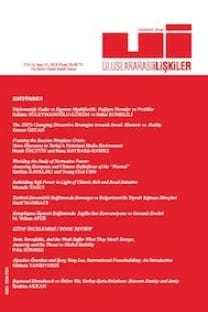Dış Politika Olarak Göç Politikası
Göç politikası son 20 yılda sosyal bilimlerde merkezi bir konuma ulaştı. Konuyla ilgili olarak yayınlanan makalelerin ve kitapların sayısının büyük oranda artmasına rağmen, göç politikasının dış politikanın konusu olmasına çok az dikkat çekildi. Literatür göçle ilgili daha çok iç politikaya ağırlık vermekte, özellikle göçün hedef ülkelerdeki etkilerine yoğunlaşmaktadır. Bu çalışma, göç politikasının iç ve dış politika unsurlarını ayırdetmekte ve dış politikanın fiiliyatta her zaman ulusal çıkarın ifadesi olduğunu açıklamaktadır. Makale sonuç bölümünde yakın zaman önce kabul edilen BM Güvenli, Düzenli ve Kurallı Göç İçin Küresel Mutabakat ve BM Mültecilere İlişkin Küresel Mutabakat bağlamında realist ve idealist/liberal uluslararası ilişkiler teorileri çerçevesinde konuyu analiz etmektedir. Çalışmanın amacı, göç politikasının ihmal edilen bu alanına dikkat çekmek ve bu konuyla ilgili hem devletler hem de uluslararası kurumlar perspektifinden yapılacak çalışmaları teşvik etmektir.
Anahtar Kelimeler:
Göç Politikası, Uluslararası İlişkiler, Dış Politika, Egemenlik, Yönetilen Göç
Immigration Policy as Foreign Policy
Immigration policy has taken centre stage in the social sciences over the past 20 years. Despite the proliferation of articles and books in this field, very little attention has been paid to immigration policy as foreign policy. It is domestic policy that prevails in the literature, most notably about the effects of immigration on destination societies. This article distinguishes the domestic and foreign policy aspects of immigration policy, acknowledging as it does so that foreign policy is virtually always an expression of national self-interest. It concludes with observations on the realist and idealist/liberal approaches to international relations theory including with respect to the recently adopted United Nations Global Compact for Safe, Orderly, and Regular Migration and the United Nations Global Compact on Refugees. Its purpose is to draw attention to this neglected aspect of immigration policy and to encourage others to explore it in greater detail, from the perspectives of both individual states and the world’s international institutions.
Keywords:
Migration Policy, International Relations, Foreign Policy, Sovereignty, Managed Migration,
___
- Sandrina Antunes and Isabel Camisao, “Introducing Realism in International Relations Theory”, 27 February 2018, https://www.e-ir.info/2018/02/27/introducing-realism-in-international-relations-theory/ (Accessed 30 June 2020).
- ISSN: 1304-7310
- Başlangıç: 2004
- Yayıncı: Uluslararası İlişkiler Konseyi Derneği İktisadi İşletmesi
Sayıdaki Diğer Makaleler
Dış Politika Olarak Göç Politikası
Uluslararası İlişkilerde Bir Kaldıraç Unsuru Olarak Göç: Türkiye Örneği
Türkiye'nin Suriye Kaynaklı Kitlesel Göçe Yanıtı: Neoklasik Realist Bir Analiz
Zeynep ŞAHİN MENCÜTEK, N. Ela GÖKALP ARAS, Bezen BALAMİR COŞKUN
İklim Göçü: Yeşil Teori Bağlamında Bir Güvenlik Analizi
Tayyar ARI, Fatih Bilal GÖKPINAR
Bezen Balamir Coşkun-Selin Yıldız Nielsen, Encounters in the Turkey-Syria Borderland
Almanya’daki Türkiye Kökenli Göçmenlerin Siyasi Katılımı ve Parti Tercihleri
Hacı Halil USLUCAN, Martina SAUER
AB’nin Sorgulanan Küresel Aktörlüğü: AB-Türkiye Göç Mutabakatı Üzerine Bir Tartışma
Göç Çalışmaları İçin Birleşik Teorik Yaklaşım Önerisi: Uluslararası Göç Sistemlerinin Ağ Analizi
